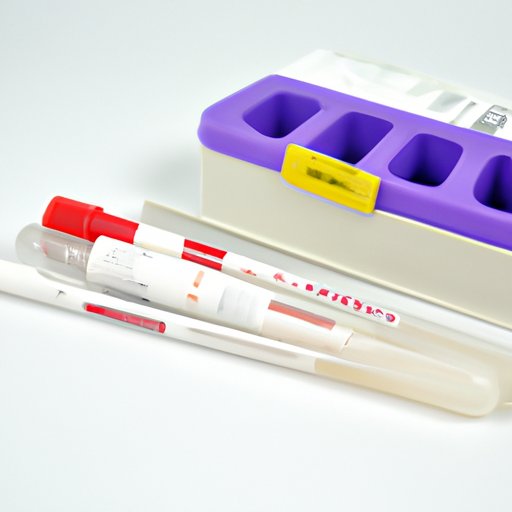
I. Introduction
Do you know your blood type? Blood type is an important piece of information that can have medical implications, impact your health, and is necessary for certain procedures. In this article, we will explore different methods to determine your blood type, including at-home test kits and medical exams. We’ll also delve into the importance of knowing your blood type and how it can impact your overall wellbeing.
II. At-Home Blood Type Test Kits
If you want to know your blood type in the privacy of your own home, at-home blood type test kits are an option. These kits are available in drug stores, supermarkets, and online. Most test kits work by pricking your finger, placing blood on a test strip, and waiting for the results. The test will identify your blood type by detecting either antigens or antibodies in your blood.
It is important to note that at-home test kits may not always be accurate and a second test from a medical professional may be necessary for verification.
III. Importance of Knowing Your Blood Type for Medical Purposes
Knowing your blood type is crucial for medical purposes. In case of an emergency, it allows healthcare providers to quickly provide you with the right blood type during a blood transfusion. Additionally, it helps determine whether your blood can be used for someone else in need.
If you do not know your blood type, it’s important to speak with a healthcare provider to request a blood test. This can be done during a routine visit or if you are donating blood.
IV. Differences Between Blood Types and Their Impact on Health
There are four main blood types: A, B, AB, and O. Each type has its own set of characteristics and can impact overall health and susceptibility to certain diseases. For instance, blood type O is considered the universal donor and is in high demand for blood transfusions. Blood type AB is the universal plasma donor, meaning their plasma can be used for anyone.
Research has also shown that certain blood types may be more susceptible to certain diseases. For instance, those with type A blood may be more vulnerable to severe forms of COVID-19, while those with type O blood may have a lower risk of the disease.
V. Methods Used by Medical Professionals to Determine Blood Type
Medical professionals use various methods to determine blood type. One way is through laboratory testing, including blood typing and crossmatching. Blood typing tests identify the antigens on the surface of red blood cells and determine your blood type. Crossmatching is used to establish compatibility between the donor’s blood and the recipient’s blood.
Physical examinations are another method used to determine blood type. This includes inspection and palpation of veins and may provide an idea of the blood type, but is not a conclusive method.
VI. Different Types of Blood Donations
There are different types of blood donations that people can contribute, including whole blood, platelets, and plasma. If you have never donated blood before, this is an opportunity to find out your blood type. Blood donation centers usually test your blood type before accepting donations and will inform you of your blood type after testing.

VII. Common Questions and Misconceptions About Blood Types
Q: Is it true that your blood type affects your personality?
A: No, there is no scientific evidence to support this.
Q: Can you change your blood type?
A: No, your blood type is determined by genetics and cannot be changed.
Q: Is it true that people with type O blood can only receive type O blood?
A: No, people with type O blood can receive blood from any blood type, but they can only donate to people with type O blood.
VIII. Personal Account of Discovering My Blood Type
When I was young, I never thought to ask about my blood type. It wasn’t until I started volunteering at a blood drive that I finally found out my blood type was O+. Knowing my blood type gave me peace of mind and I felt proud to be a universal donor. I encourage everyone to take steps to know their blood type, as it can make a difference in someone’s life.
IX. Conclusion
Knowing your blood type is an important piece of information that can impact your health and the lives of others. Whether through an at-home test kit or a visit to a healthcare provider, taking the time to determine your blood type is a valuable step in taking control of your wellbeing.




